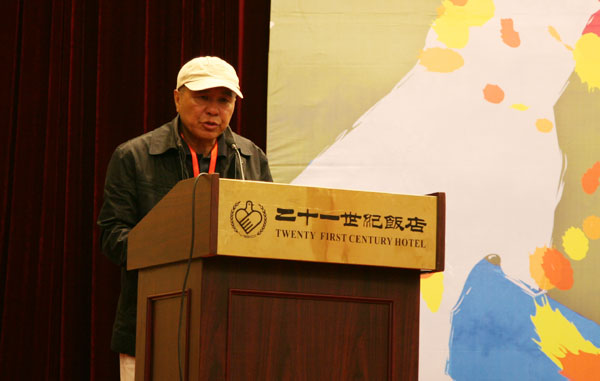Taiwan filmmakers seek future on mainland
 |
|
Veteran Taiwan filmmaker Hou Hsiao-Hsien speaks during the 4th annual Chinese Young Generation Film Forum in Beijing on November 2, 2009. [Xie Tingting/CRI] |
The annual Taiwan Golden Horse Film Festival and Awards, kicking off November 5 this year, is known as the Chinese-language Oscars. But they have seen almost no best-director winners from Taiwan since 1996.
The awkward fact about Taiwan filmmakers is that for at least a decade, they have been eclipsed by their counterparts from Hong Kong and the Chinese mainland at their own film festival.
Award recognitions aside, box-office performance of Taiwan films has generally been upset. "Since Hollywood films entered Taiwan a decade ago, what they've done has been to oppress local films," Taiwan director Chu Yin-Ping said recently.
Facing a depressing filmmaking climate in Taiwan, some directors came to the mainland, like Chu; some chose to wait back in Taiwan for a breakthrough. "They are doing other jobs in this business - acting, making music videos or television dramas. I think they have paid their dues," Chu said.
Last year, Wei Te-Sheng, who had been a screenwriter and assistant director for many years before making his feature length directorial debut, "Cape No. 7", brought hope to Taiwan's filmmakers. The romantic musical-drama was so popular that it took less than three months to become the second top-grossing film in Taiwan's cinematic history, only after "Titanic".
Following Wei, actor-turned-director Leon Dai is making headlines this year with his second feature length film, "No Puedo Vivir Sin Ti" ("I Cannot Live without You"). The tear-jerker premiered in July, and has won acclaim from both the public and the critics. The film is a strong competitor at this year's Golden Horse Awards, having won eight nominations including best film and best director.
Wei and Dai are examples of a number of young directors who are like seedlings in the barren soil. The question now is: How to help these new hopefuls grow? Li Xing, a 79-year-old prominent director from Taiwan, points out the key to the mainland, "The largest market for Chinese-language films is in the mainland. If Taiwan directors can attract mainland audiences, they will get more investment and more opportunities to make films."
In an effort to let mainland audiences know more about them, Li Xing has led what he calls "the biggest group of Taiwan filmmakers ever to the mainland," attending seminars and meeting Beijing moviegoers during the 4th Chinese Young Generation Film Forum happening this week.
Known for their pursuit in aesthetics and focus on everyday life, the Taiwan directors were encouraged to showcase their work to Beijing audiences. Meeting with mainland investors is also on the schedule. Leon Dai for example, is given the opportunity to find financial support for his next project during the forum.
Seeing accelerating Taiwan-mainland film cooperation as a lifelong goal, Li Xing told attendees at the forum, "I want Taiwan directors to realize that the market for their films is not limited to Taiwan."
 0
0 







Comments